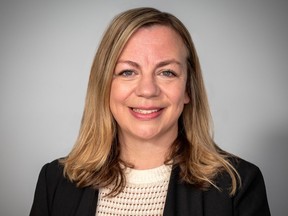
Article content
She has already pushed outside the box by becoming the first woman to lead research enterprises at the University of Ottawa Heart Institute.
And Dr. Katey Rayner, who was appointed this week chief scientific officer and vice-president of research at the Heart Institute, said thinking outside the box will be a focus of her leadership in her new roles as chief scientific officer and vice-president of research at the Heart Institute
Advertisement 2
Article content
Article content
“Research really excites me and I am excited to apply it maybe a little more broadly and think a little more outside the box,” she said.
Rayner’s appointment was called a landmark moment by the Heart Institute’s president and chief executive officer Dr. Rob Beanlands.
“Dr. Rayner is a talented and accomplished scientist whose expertise is sought worldwide. She is a passionate advocate who believes science and research are integral to enable world-class patient care,” Beanlands said.
Rayner is recognized globally for her research contributing to better understanding the role inflammation plays in driving atherosclerosis and cholesterol metabolism. In addition to her newly announced role at the Heart Institute, Rayner is assistant dean of research and special projects in the faculty of medicine at uOttawa where she is a professor in the department of biochemistry, microbiology and immunology. She is also director of the Cardiometabolic mecroRNA Laboratory at the Heart Institute, among other professional and leadership roles.
“Anyone who knows me knows I am pretty energetic, and I am bringing that to this role,” she said.
Advertisement 3
Article content
Among trends that will help shape cardiovascular research in coming years is the growing movement to understand and treat what is driving heart disease in patients, she said.
“We are more and more recognizing that people aren’t just heart patients, they are whole people and they are experiencing life in all sorts of different ways.”
That means sociodemographic factors, the way people live and work, are all important areas to understand when it comes to their heart health and how it should be treated.
She said getting into the community to make sure more people not only have access to care but to research is increasingly important. There is growing health data available from neighbourhood studies, she noted, and turning some of that data into action will be a priority for researchers.
“That is what we are moving toward,” she said. “If research stays in the lab but doesn’t get out into the community we don’t learn from each other.”
She also said she expects to see breakthroughs in the area of mRNA therapies for heart disease in coming years.
“These therapies are going to change medicine in many different ways.” Among those changes could be the use of mRNA therapies to target cholesterol, which could eventually replace medication, she said.
Advertisement 4
Article content
Rayner said she has heard from people that seeing a woman in her role is inspiring.
“It is a very small step toward the realization that having different voices in leadership bringing different perspectives changes things.”
Rayner takes over the role as of July 4, succeeding Dr. Peter Liu, who held the post for 12 years.
Rayner called it an important time for research in Ottawa right now.
“There’s a lot of momentum, a lot to build on in our region.”
Recommended from Editorial
Article content
https://news.google.com/rss/articles/CBMifmh0dHBzOi8vb3R0YXdhY2l0aXplbi5jb20vbmV3cy9sb2NhbC1uZXdzL2hlYXJ0LWluc3RpdHV0ZXMtZmlyc3QtZmVtYWxlLWNoaWVmLXNjaWVudGlmaWMtb2ZmaWNlci1haW1zLXRvLWZvY3VzLW91dHNpZGUtdGhlLWJveNIBAA?oc=5
2024-04-11 17:14:03Z
CBMifmh0dHBzOi8vb3R0YXdhY2l0aXplbi5jb20vbmV3cy9sb2NhbC1uZXdzL2hlYXJ0LWluc3RpdHV0ZXMtZmlyc3QtZmVtYWxlLWNoaWVmLXNjaWVudGlmaWMtb2ZmaWNlci1haW1zLXRvLWZvY3VzLW91dHNpZGUtdGhlLWJveNIBAA


Comments